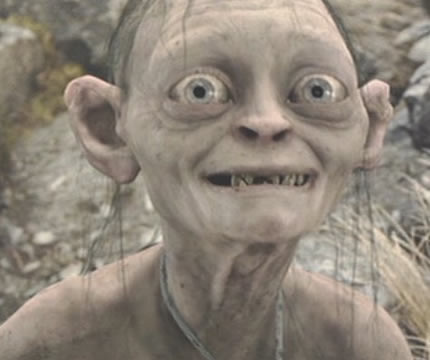SPOILER ALERT - If you haven't finished Harry Potter or Lord of the Rings do not, I beg, read this blogpost. Be off with you to the library or bookstore and check out both series.
Yesterday, I wrote about Karma and how the idea of Nemesis must exist, internally at least. Later, one comment on the blogpost really grabbed my attention. A friend wrote that once someone does evil, and does it again, the internal guilt eases until the dark deeds are seen as "normal" by that person.
She's right, and it erases my neat metaphor of an interior angry goddess. However, I do wonder about the dreams of the people who live with dark deeds, as well as their lives. If someone is truly evil, truly in the dark side - can anything be satisfactory? Love, life, family, relationships? Do they have friends?
Oh, the fascination of villains.
My sister, whose intellect I greatly admire, once told me that in her opinion a great book offers redemption for the villain. As an example, in the Lord of the Rings trilogy, Gollum (that strange, brilliant character) is redeemed by one act at the very end, thus saving Frodo from soulless eternity.
Another example is Snape, although that dude is seriously complex. I wonder as an author, if he developed himself on the page, or if JK suddenly had one of the concept flashes, the kind that hit just as you get into bed and you haven't any paper handy. (Although, of course, he isn't a villain at all.)
Redemption for the villain ... it's a tricky concept. It has to be organic and come from within (thus bypassing the interior angry goddess) or from a series of events that evolve naturally, like a Bach concerto or the inside of a seashell. The writer has to seriously Fibonacci sequence it.
If redemption is handed out with a Deus ex Machina fanfare, the gloriously evil villain is compressed into a cardboard cutout. No, redemption itself must come, like karma, from within.
A final word on villains - as I was writing this post, my sister and some of our friends from high school were facebook chatting about a murderer.
The murderer didn't seem to be evil, so much as STUPID. Her act of violence and terror came from being so dumb that she couldn't comprehend that it would change her life (and, most sad of all, the lives of her kids) forever.
That is real life, not fiction, and it brings me back to the concept of karma. Probably that sad little murderer will never even understand the depths of what she has done. But will she ever feel soaring happiness of motherhood, the solid comfort of an enduring marriage, or the quiet triumphs that come with ordinary life?
Of course, all of that is pretty impossible behind bars. But the prison I wonder about is the one in her own mind.
If someone does something that is a wonderful act of kindness for no reason other than it seems right at the time, does that person receive good karma?
And, conversely, if another person does harm, an act of "douchebaggery," simply because they are themselves a plastic bag fitted with a nozzle and they enjoy the drama that results - will that person receive bad karma?
It's almost unbearable to think that they will not, in the end, reap the opposite rewards of their opposite acts. In the ongoing cycle of the universe, does one action affect another and another, to create a sort of house of cards or domino falldown, each tile tipping against another and another?
"To every action there is always an equal and opposite reaction: or the forces of two bodies on each other are always equal and are directed in opposite directions." - Newton
This law of motion seems to support the concept of karma in a way that agrees with physics - at some point, a deed, whether good or bad, will start something else to occur. But will that reaction come back to haunt (or to favor) the person who started it all?
In Shakespearian tragedy, all of the story comes from one terrible act, caused by the hero's fatal flaw. After Macbeth kills the king, the murder causes more murder until the country is at war. It's as though the fatal flaw is a hideous spider in a web, effecting "equal and opposite reactions" from plucking one sticky string.
Woody Allen's view is quite different. In "Crimes and Misdemeanors," the central figure gets away with murder, and the good guy who follows his heart and passions gets nothing. There is no karma in that movie.
And to me, that just seems wrong. There must be karma. A bad act reaps evil; a good one delivers happiness.
Does that karma come from a beautiful, vengeful goddess, wielding lightning and slinging metaphysical swords?
Maybe. But how much more interesting would it be if that Karmic goddess lived inside our bodies, and we exacted karmic vengeance or rewards on ourselves. An act of good, even though it is unseen and unrewarded, creates a point of light within our souls, where it grows and interacts with everything we are - memories, dreams, creation.
An act of evil, no matter how much the person may defend it, creates a point of darkness which also grows within. JK Rowling used this brilliantly in creating Voldemort's character - his evil came from his own evil deeds, and each horrible act warped the character further until, at last, he was no longer even human.
So, I have to conclude that there is karma, and that is a satisfying ending. The punishments and rewards are not immediate or tangible, but they exist. Yes, indeed - they exist.

